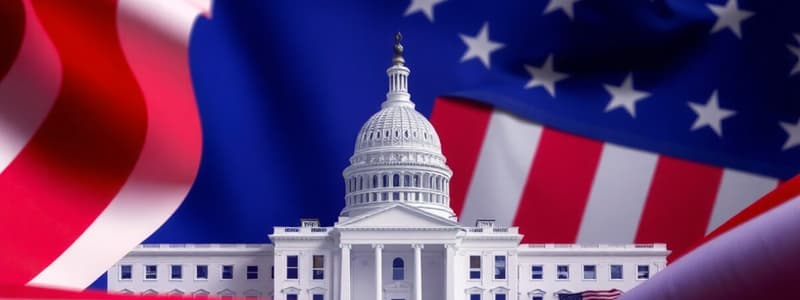Podcast
Questions and Answers
What does the principle of majority rule imply about individual rights?
What does the principle of majority rule imply about individual rights?
- It can completely disregard individual rights.
- It only protects the rights of the majority.
- It can change individual rights based on popular opinion.
- It must respect individual rights protected by the Constitution. (correct)
Which document is NOT considered a major American state paper?
Which document is NOT considered a major American state paper?
- United States Constitution
- Articles of Confederation
- Federalist Papers (correct)
- Declaration of Independence
What is the main function of the Executive Branch of the government?
What is the main function of the Executive Branch of the government?
- Reviews laws.
- Interprets laws.
- Makes laws.
- Carries out laws. (correct)
Which statement best defines popular sovereignty?
Which statement best defines popular sovereignty?
Who is responsible for electing the President of the United States?
Who is responsible for electing the President of the United States?
What is state sovereignty?
What is state sovereignty?
Which of the following branches of government makes laws?
Which of the following branches of government makes laws?
What system is in place to limit the power of the majority in the United States?
What system is in place to limit the power of the majority in the United States?
What does it mean to be impeached?
What does it mean to be impeached?
Which branch of government has the power to veto bills?
Which branch of government has the power to veto bills?
According to Washington's quote, how should incorrect distributions of constitutional powers be addressed?
According to Washington's quote, how should incorrect distributions of constitutional powers be addressed?
Why might Luther Martin claim that the Constitution was inconsistent with the principles of the Revolution?
Why might Luther Martin claim that the Constitution was inconsistent with the principles of the Revolution?
What is one step forward for the principle of equal protection under the law?
What is one step forward for the principle of equal protection under the law?
What is one step backward regarding equal protection under the law?
What is one step backward regarding equal protection under the law?
Which of the following statements about amending the Constitution aligns with Washington's view?
Which of the following statements about amending the Constitution aligns with Washington's view?
Which branch has the authority to declare acts of other branches unconstitutional?
Which branch has the authority to declare acts of other branches unconstitutional?
Flashcards
Majority
Majority
The larger part or group in a comparison.
Minority
Minority
The smaller part or group in a comparison.
Majority Rule
Majority Rule
The principle where the opinion of the more people wins.
State papers
State papers
Signup and view all the flashcards
Major US State Papers
Major US State Papers
Signup and view all the flashcards
Popular Sovereignty
Popular Sovereignty
Signup and view all the flashcards
State Sovereignty
State Sovereignty
Signup and view all the flashcards
Electoral College
Electoral College
Signup and view all the flashcards
Impeachment
Impeachment
Signup and view all the flashcards
Constitutional Amendment
Constitutional Amendment
Signup and view all the flashcards
Veto
Veto
Signup and view all the flashcards
Unconstitutional Act
Unconstitutional Act
Signup and view all the flashcards
Principle of Equal Protection
Principle of Equal Protection
Signup and view all the flashcards
Constitutional Inconsistency
Constitutional Inconsistency
Signup and view all the flashcards
Step Forward of principle
Step Forward of principle
Signup and view all the flashcards
Step Backward of principle
Step Backward of principle
Signup and view all the flashcards
Study Notes
Majority and Minority
- Majority refers to the larger part or group in a comparison.
- Minority refers to the smaller part or group in a comparison.
- Majority rule protects individual rights, as these are protected by the Constitution.
- The power of the majority is limited by federalism, democracy, a system of representation, and the protection of individual rights.
State Papers
- State papers are historical documents.
- The three major US state papers are the Declaration of Independence, the Articles of Confederation, and the United States Constitution.
Popular Sovereignty and State Sovereignty
- Popular sovereignty means the people are the highest legal authority.
- State sovereignty means the states are the highest legal authority.
Branches of Government
- The three branches of government are: Legislative, Executive, and Judicial.
- The Legislative Branch makes laws.
- The Executive Branch carries out laws.
- The Judicial Branch interprets laws.
- Congress is the Legislative Branch, including the Senate and House of Representatives.
Checks and Balances
- A check of power for each branch of government ensures no single branch becomes too influential.
- Examples include the Legislative Branch impeaching elected officials, the Judicial Branch declaring acts unconstitutional, and the Executive Branch vetoing bills.
Impeachment
- Impeachment means being charged with misconduct.
Constitutional Amendments
- The Constitution can be amended to correct perceived flaws in its distribution of power.
- Amendment procedures are outlined in the Constitution.
The Constitution and Slavery
- Critics argued the Constitution was inconsistent with ideals of liberty and equality due to its initial acceptance of slavery.
- The Founding Fathers' views on ideals such as liberty, equality, and self-government are complex and often contradictory.
Equal Protection Under Law
- Equal protection under law is a principle in US government.
- A step forward was the Brown vs. Board of Education decision which ended segregation.
- A step backward was the internment of Japanese Americans during World War II.
Studying That Suits You
Use AI to generate personalized quizzes and flashcards to suit your learning preferences.




